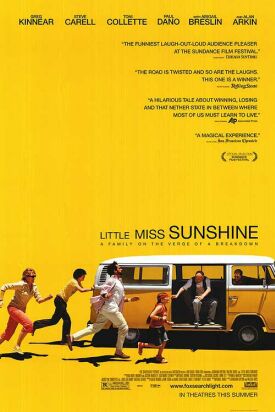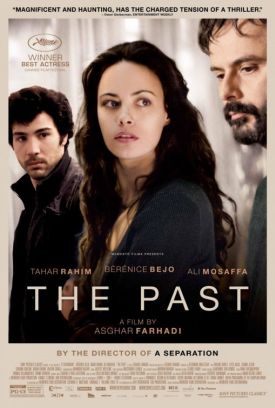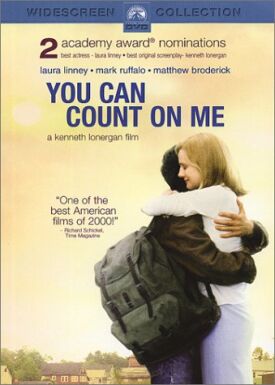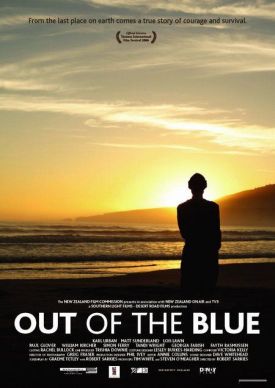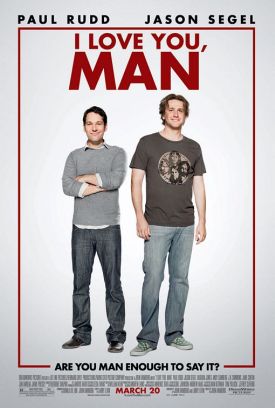Little Miss Sunshine
Little Miss Sunshine, directed by Jonathan Dayton and Valerie Faris from a screenplay by Michael Arndt, is a likable little movie about the American ethos, which it is not unique in finding in the idea of getting ahead, of being a winner not a loser. Greg Kinnear plays Richard, who is a walking paradox: the failed designer of a self-help success course called “The 9-Step Refuse-to-Lose Program.” But he’s no hypocrite. True to his philosophy, he refuses to lose — or at least to acknowledge himself a loser — which makes him even more of a loser to everybody but himself. His antithesis is his brother-in-law, Frank, played against type by Steve Carell. Frank is a gay Proust scholar who has recently been betrayed by his grad-student lover with his great scholarly rival and who has attempted suicide as a result. Now he comes to live with his sister, Sheryl (Toni Collette), who is Richard’s wife, Richard and Sheryl’s two children and Richard’s foul-mouthed, obscene, drug-addicted father, played by the great Alan Arkin.
The children are Dwayne (Paul Dano), a Nietzsche-fancying quasi-Goth teenage depressive who has taken a vow not to speak until he becomes an Air Force pilot, and Olive (Abigail Breslin), a not-especially-attractive child of nine who has her sights set on becoming a beauty queen. When the winner of a pre-pubescent beauty contest in which Olive managed to finish as runner-up cannot perform her duties, the little girl is invited to go to California to compete in the “Little Miss Sunshine” pageant. Richard sees this contest as a test of his own prescriptions for success, and anyway Stan Grossman (Bryan Cranston), his last hope of finding a market for the Refuse-to-Lose Program, is to be found on the way in Arizona. So the family, including Frank and Grandpa, is packed into an aging Volkswagen bus — the failure of whose clutch means that everyone has to get out and push it up to speed after every stop — and they rush to make the contest in time in spite of one mishap after another along the way.
There’s a lot of comedy in these rather familiar travel disasters as in the sniping between the main characters. “Uncle Frank gave up on himself,” Richard tells his children: “that’s something that winners never do.” But the strength of the film lies more in the contradictions within the characters than in those between them. While Richard’s relentlessly upbeat personality always hints of tragedy, Frank’s theatrical misery is inescapably comic. Exposed to Frank’s irony, Richard earnestly says that “sarcasm is the refuge of losers; it’s losers’ way of bringing winners down to their level.” Meanwhile, Frank is so lost in self-pity that when his sister tearfully tells him, “I’m glad you’re still here,” he doesn’t think twice about replying: “That makes one of us.” Yet he finds a kind of soul-mate in self-pity in Dwayne, who with equally unconscious humor wears a T-shirt emblazoned with the words: “Jesus Was Wrong!” When Frank is forced to share a bedroom with the non-speaking Dwayne, the latter scribbles on a pad: “Welcome to Hell.”
“Coming from you, that means a lot,” says Frank.
Nevertheless, he assures Dwayne that he won’t attempt suicide again while they are sharing a room. It is one of many indications that, underneath their apparent hostility to one another, the family is bound together by real love and affection. Not that the hostility cannot at times be terrifying. When Dwayne finally speaks it is to lash out at everybody, and especially those who hold out to him the consolation of the family.”I don’t want to be your family. I hate you. You’re all f******* losers: divorce, bankrupt, suicide.” We see that both he and Olive have adopted as their own Richard’s success-worship — and with it have become even more miserable than their father. Olive confides in her grandfather her anxieties about the contest: “I don’t want to be a loser,” she says. “Daddy hates losers.”
Another film would make this a conclusive and unappealable indictment against Richard, but Little Miss Sunshine has the courage not to make him a monster. Instead, he is merely one of the two poles at the rather ridiculous extremes of human nature, and poor Sheryl is left to spend her time trying to hold the line between the grim optimism of Richard and the luxurious despair of Frank. Meanwhile, Grandpa’s interest in pornography and hard drugs — “I’m old!” he says. “When you’re old, you’re crazy not to do it” — and his instruction of Dwayne in the virtues of promiscuity prove to be no bar to his acting as coach to little Olive for the song-and-dance routine meant to manifest her “talent” in the contest. This performance, when it finally comes at the climax of the picture, is all that we might have expected it to be, yet it reflects much more harshly on the creepy people who run such contests than it does on Grandpa.
I was a little disappointed that the movie didn’t spend more time on Richard’s failed prescription for success, Refuse-to-Lose. There seems so much more to be done with this than simply to have Richard accept, for the moment at least, his losses in the end. “It’s not the program, Richard,” says Stan Grossman when Richard finally tracks him down. “It’s you. Nobody knows who you are. . . It’s time to move on.”
The apparent inability to move on is the only thing that these comical bus-pushers have in common and, sure enough, at first Richard does what he always does by vowing to redouble his efforts. “This is what the nine steps are all about,” he says. But in the end, he and Frank both have to learn from Olive, who inadvertently teaches the whole family that sometimes the greater honor is in failure than in success.
Discover more from James Bowman
Subscribe to get the latest posts to your email.

